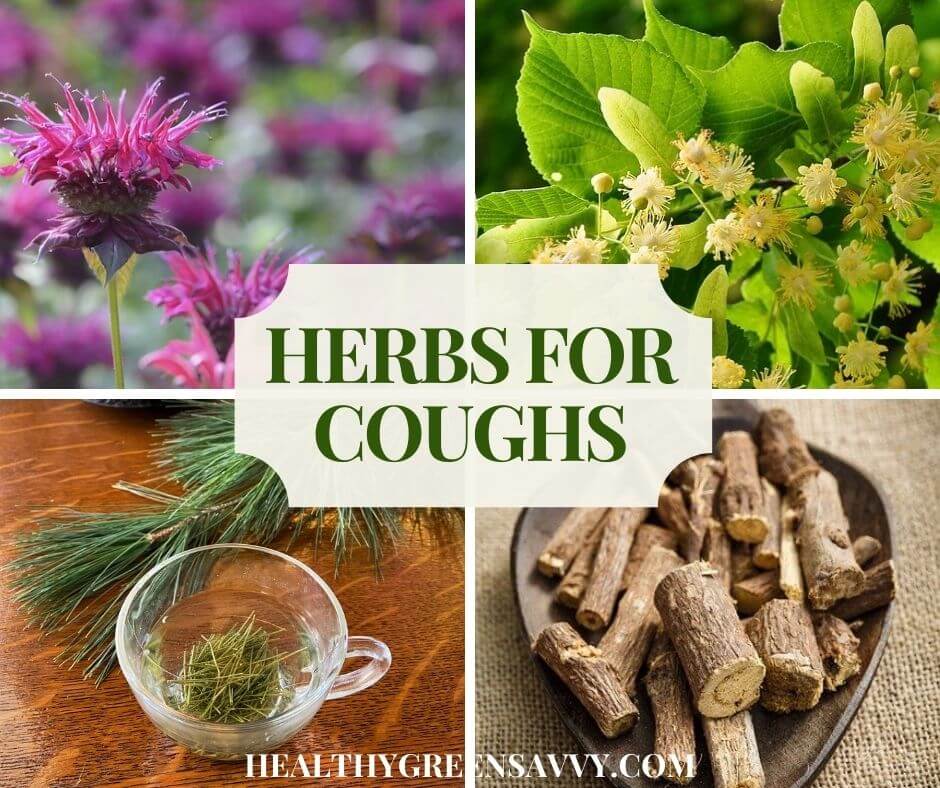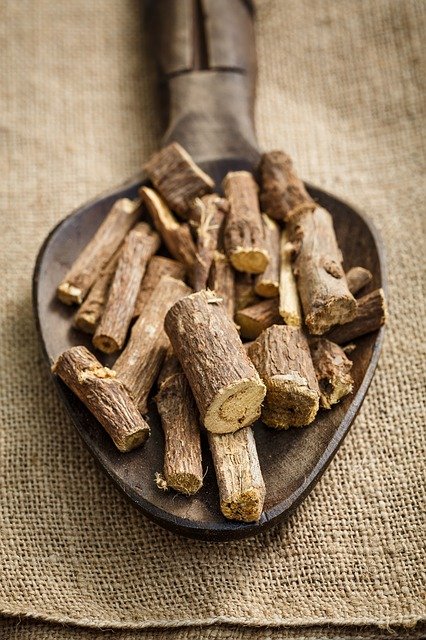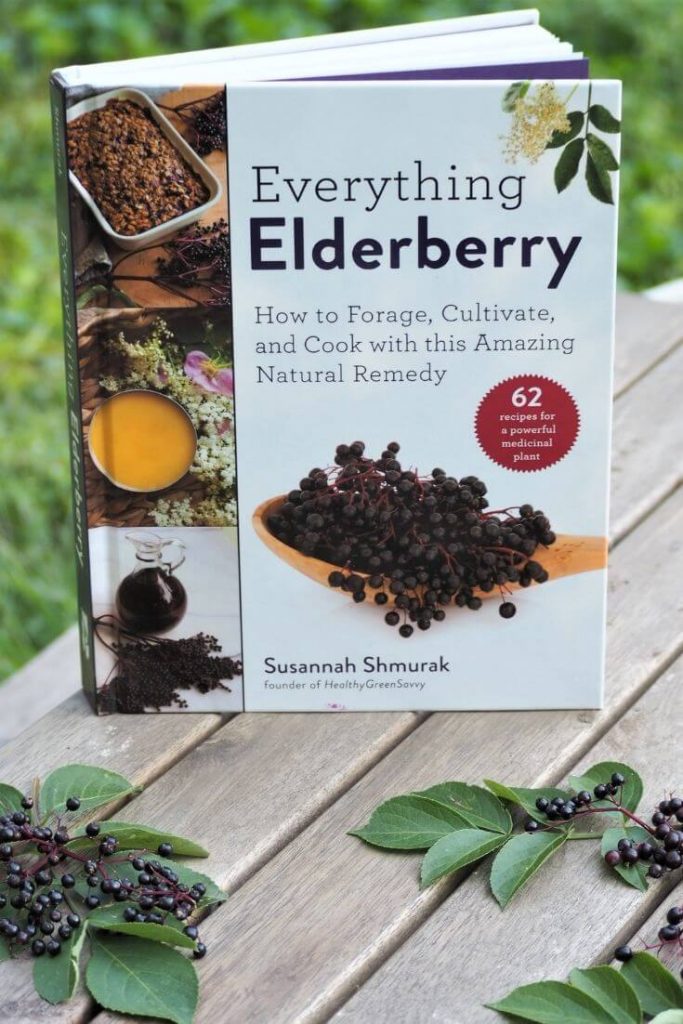Last Updated on February 14, 2024
Looking for an effective way to relieve a cough? These herbs for coughs can help thin mucus and soothe irritated airways to help you recover from your cough more quickly.

Many herbal remedies for cough can be found in most kitchens, like honey, ginger, orange peel, and thyme, while others are herbs you can easily forage, grow, or purchase to help you make effective DIY cough remedies like teas, syrups, oxymels, and lozenges.
You’re likely already growing many of these potent herbal remedies for coughs, which make beautiful and versatile additions to the garden. Even if you don’t have a veggie patch, consider adding some of these beneficial plants to your ornamental garden beds, and enjoy harvesting plant medicine all season long.
FINDING THE BEST HERBS FOR COUGH
My first stops for tried-and-true herbal remedies are Rosalee de la Forêt’s Alchemy of Herbs and Rosemary Gladstar’s Medicinal Herbs. I also love James Duke’s tiny but info-packed Green Pharmacy, which consolidates decades of his research in plant remedies from around the globe. (Those are Amazon links, but if you’d rather support independent bookshops, you can also get them on Bookshop.org, where you can find these and other excellent guides to using herbs. Here are my top recommendations for herbal medicine books.)
Gladstar’s book includes a homemade cough syrup with licorice, mullein, and wild cherry bark, and another using thyme and honey. Alchemy of Herbs has a recipe for cough syrup for dry coughs made with wild cherry bark, marshmallow, and thyme and a thyme oxymel.
A previous post on the best home remedies for cough covered identifying what’s causing a cough and distinguishing between a wet and dry cough, since you’ll want to treat these types of coughs differently. Check out that post for more on food remedies and other ways to help a cough if you don’t have any of the herbs listed below at the ready.
Different Herbs for Different Coughs
What kind of cough you have and what’s causing it will affect your choice of herb to help it. If your cough is related to allergies or GERD, you’ll need to address those issues rather than simply treating the cough.
Many coughs are a result of viral infections, and coughing is one way our bodies try to clear the infection. We generally don’t want to suppress “wet” or “productive” coughs that are trying to expel mucus, and certain herbs can help by thinning mucus to make it easier to get out. Herbs that soothe irritation can help quell an annoying dry cough.
Demulcents help to coat irritated tissues, alleviating the urge to cough. The Herbal Academy notes that some demulcents are more powerful than others, including licorice, marshmallow, and violet in the stronger group, and labeling mullein, linden, and plantain leaf as more mild demulcents.
Dry coughs and coughs that keep you from getting the sleep you need can be suppressed with herbs that have antispasmodic actions, such as valerian and cramp bark.
Expectorant herbs like wild cherry bark, mullein, and linden help thin mucus, making it easier to expel.
Note that unlike food-based home remedies for cough covered in the last post, many herbs should only be consumed in small amounts and for short periods of time.
–> Always check for health warnings and contraindications and consult a physician before using any herb.
Many of these herbs are not recommended for use in pregnancy or with small children.
WHERE TO GET HERBS FOR COUGH
While some effective herbs for cough can be easily grown or foraged, others need to be purchased. If you have access to a pine tree, you can find pine needles all year round, and you can forage wild violets, plantain, yarrow, and elderberry during the growing season and dry them for use when you need an herb for cough. Herbs like sage, thyme, and bee balm are easy to grow and add beauty to any home garden.
If you don’t have foraging access to these herbs, you can purchase them at natural food stores or online. I buy herbs I use often and in large quantities (like those in my go-to herbal tea blends) by the pound from trusted sources like Mountain Rose Herbs or Starwest. Many herbs are sold in 4 oz quantities as well as by the pound. You can also find many of them on Vitacost, Amazon and other online retailers as well as on Etsy.
But those I use in smaller amounts for acute situations rather than daily use, like marshmallow root or licorice root, I prefer to get in small quantities at my local natural foods store. If yours has a bulk herbs section, you’ll find these herbs and more available to sample in very small amounts.
You can also get pre-made tea blends that include herbs for coughs. Traditional Medicinals, a company founded by Rosemary Gladstar, makes a soothing tea called Throat Coat with herbal ingredients like licorice and slippery elm, which can help soothe coughs and make sore throats feel better.
Ricola cough drops also contain numerous herbs for cough, and can be found easily at most drug stores and supermarkets.
FORAGING HERBS FOR COUGH
So many common plants that grow in our yards have useful medicinal properties. Harvest and dry some in summer, and you’ll have free ingredients for your herbal apothecary on hand when you need them. Native Americans used many of these common wild herbs for coughs.
Drying violet and plantain leaves or putting up some foraged elderberries is an enjoyable way to get many of your herbal remedies for cough for free. Pine needles, which can be brewed into tea or made into an herbal cough remedy, are readily available all year round, making them an especially useful herb for cough to know about.
If you do forage some of your herbal cough remedies, ALWAYS make sure to correctly identify a plant before foraging. Always consult a good field guide to positively identify any plant before picking. Here are some of the best foraging books I’ve found.
You can also take a foraging class, like the Herbal Academy’s online foraging course, which teaches plant identification and ethical wildcrafting practices. They offer a fantastic array of classes on using herbs as well. Here’s a list of the courses they’re currently enrolling.
BEST HERBS FOR COUGH: DEMULCENTS TO SOOTHE
Marshmallow Root
A relative of hibiscus, marshmallow root soothes and helps heal inflamed tissues. It’s often recommended for dry coughs and sore throats, and is also anti-inflammatory. It’s typically prepared as a cold infusion. Here’s more on using marshmallow from Rosalee de la Forêt.
Slippery Elm
Slippery elm’s name says it all: It’s mucilaginous, or slippery, meaning it’s wonderful for coating the throat. Slippery elm is often used in cough remedies, as it soothes the throat and helps alleviate the urge to cough. Slippery elm is an at-risk plant, so be sure to get yours from a source that harvests it sustainably. Vitacost carries a number of options.
Violet
One of my favorite edible weeds, wild violets aren’t just a beautiful addition to salads, they’re a valuable herb for cough as well. Though the flowers are around only a short time, the medicinally-useful leaves are available for most of the growing season. You can make a simple violet tea, syrup, or tincture to soothe coughs. Explore our collection of wild violet recipes for additional ideas.
Plantain
Plantain is another common “weed” with fantastic medicinal properties. Its leaves make an excellent demulcent infusion that can help quiet a cough. Here’s more on using plantain from Herbal Academy.
Licorice Root
Licorice is not only a helpful remedy for soothing cough, it’s often commended as a powerful antiviral herb. It has a strong flavor, so it may work best in small amounts with other herbs. Note that it raises blood pressure and shouldn’t be used long-term. I find licorice very stimulating, so I tend to avoid it near bedtime.

BEST HERBS FOR COUGH: EXPECTORANTS & DECONGESTANTS
Hyssop
Hyssop is another centuries-old remedy for coughs and colds. It’s expectorant and anti-spasmodic as well as antiviral, which makes it exceptionally useful for dealing with coughs. Use it in tea, oxymels, or syrups to help with coughs. Note that hyssop (Hyssopus officinalis) is often confused with anise hyssop (Agastache foeniculum), a North American cousin used by indigenous peoples for cough as well. Here’s more about hyssop benefits from Maud Grieve’s A Modern Herbal.
Wild Cherry Bark
The Herbal Academy reports that wild cherry bark “has expectorant, antitussive, astringent, antispasmodic, anti-inflammatory, bitter, and nervine actions,” and is a popular remedy for coughs that also benefits the circulatory and digestive systems. It can be taken in a tincture, cold infusion, decoction, or syrup, and you’ll often find it included in herbal cough syrups.
Mullein
Mullein is considered very useful for lung complaints. An anti-inflammatory, anti-spasmodic and expectorant herb, mullein appears often in recipes for herbal cough remedies and can help both dry and wet coughs. Take as a tincture or add to your herbal tea blend for cough relief. Use a teabag or strain through a coffee filter to avoid drinking mullein’s irritating hairs.
Yarrow
Yarrow is a wonderful addition to the garden, and has many benefits beyond soothing a cough. It helps alleviate swelling and can dry up mucus, according to Herbal Academy. You can take it as a tea or tincture. Here’s more on yarrow benefits and how to use yarrow.
Pine Needles
Pine needle tea is anti-inflammatory and is often recommended as an expectorant and decongestant. Pine needles (as well as edible pine cones) can also be made into a homemade cough syrup, like this pine needle syrup. You can also make a pine needle tincture to help alleviate congestion.
Here are many other uses for pine needles to explore.
Elecampane
Used often by herbalists for wet coughs, elecampane also has beneficial effects on digestion and pelvic stagnation, according to Rosalee de la Forêt. It can be used in a decoction, syrup, or tincture.
Thyme
Thyme is both an expectorant and anti-spasmodic, and can help soothe coughs. The strong flavor works well in brothy soups or can be made into a tea with lemon and honey. Lemon thyme has a milder flavor and is an easy-to-grow groundcover. It’s my favorite to use in this soothing thyme tea recipe.
It’s also easy to preserve so you always have plenty on hand. Here’s what to know about how to dry thyme.
Oregano

Oregano is inflammatory and antiviral and a traditional home remedy for cough. Like thyme, it can be made into a tea, but it may go down better in a broth.
Sage
Sage’s ability to soothe mucous membranes makes it a natural for addressing coughs and sore throats. Sage can be infused into honey or brewed as a tea (with honey and lemon for flavor and further soothing).
Ginger
Many herbalists suggest ginger as a top choice for viral infections. Ginger is an expectorant and considered helpful for cough, while also reducing inflammation and pain. Try ginger tea to soothe a cough, or add it to broth. Ginger tea can also be made with orange peel (below) to help coughs with congestion.
Orange Peel
Most people don’t realize that orange peels are rich sources of anti-inflammatory and immune-supporting compounds. They’re considered useful for addressing wet coughs and can be made into a tea on their own or with ginger and other herbs. Here’s how to make orange peel tea.
Turmeric
Turmeric is a potent anti-inflammatory, and is often suggested for soothing inflamed airways. Its drying action can help with excess mucus. Here’s more on additional health benefits of turmeric.
Ground Ivy
Ground ivy (aka creeping Charlie, that ubiquitous invader of North American lawns) is a traditional remedy for coughs and respiratory ailments as well as a huge number of other complaints. There isn’t science to back up this use, but some herbalists recommend it for coughs in combination with other herbal cough remedies. Here’s what to know about ground ivy or creeping Charlie uses.
BEST HERBS FOR COUGH: ANTI-TUSSIVES/ANTI-SPASMODICS
Linden
Linden is a mild demulcent as well as an antispasmodic, and it tastes amazing. This edible flower makes a lovely floral tea you can enjoy anytime, and it’s a great option to add to your cough-relieving herbal blend. It’s also a nervine, so I sometimes add it to my favorite herbal blend for sleep and use more if I’m dealing with a cough.
You might not have realized how many useful herbal remedies like linden are growing on trees all around you. Here are more than 25 additional medicinal trees you can use for homemade medicine.
Bee Balm
Bee balm, like thyme, contains large amounts of thymol, and like thyme it’s antimicrobial and anti-spasmodic. A traditional remedy for cough, bee balm can be prepared as a tea, infused in honey and/or vinegar, taken as a tincture, or inhaled with steam.
A lovely addition to the perennial flower garden, bee balm comes in a variety of colors and flavors. Though often called bergamot, only some varieties resemble the citrusy flavor of bergamot you may know from Earl Grey tea, while others have a spicy flavor often likened to oregano. You’ll want to taste yours before brewing so you know what you’re getting! (Oregano-flavored tea may not be everyone’s first choice.)
Richter’s Seeds carries several varieties, including the citrusy Monarda didyma.

California Poppy
California poppy is often relied upon for promoting sleep, and its antispasmodic properties make it a good choice for controlling cough at night. It’s extremely bitter, and is best taken as a tincture.
You can grow your own and make your own tincture as well.
Horehound
An ingredient in cough drops in times past, horehound’s strong flavor isn’t to everyone’s liking, but this expectorant and anti-spasmodic herb is worth considering if you’re making herbal preparations for cough and cold season. Here’s more on horehound from Herbal Academy.
Cramp Bark
Cramp bark helps control spasmodic coughs, and as a relaxant and sedative, it can also aid sleep when coughs make it hard to get the rest you need. Since it’s also an oft-recommended herb for easing muscle pain, it’s a good one to keep on hand.
Nettle
Nettle is one of those multitasking herbs to keep on hand and drink often for many reasons, including as an herbal remedy for cough. It’s anti-inflammatory, astringent, and pain-relieving, and James Duke notes its usefulness as an herb for cough.
Nettle has a pleasant taste reminiscent of green tea (but with no caffeine), and many allergy sufferers have found consuming it regularly helps with allergy symptoms. Here’s more on the benefits of nettle tea.
Valerian
Valerian is often included in sleep-promoting herb blends for its powerful sedative properties. Valerian is also anti-spasmodic, so it’s helpful to include in nighttimes teas aimed at controlling a cough. Here are some tea blends for cough and cold. It’s best to reserve valerian for nighttime, as it can make you very sleepy and may not be safe if you need to drive or operate machinery.
Elderberry
As an herb for cough, elderberry has much to recommend it, especially when combined with other herbal remedies for cough. This research-backed homemade elderberry syrup contains several other ingredients for calming a cough, including ginger, cinnamon, clove, and honey; you can add orange peel or other herbs for cough if you like.
Elderberry also stimulates your immune system and helps your body fight off viruses to help you recover more quickly. You can also make a tasty elderberry tea that can help soothe a cough or sore throat. Here are other uses for elderberries and more on the benefits of elderberries.
Elderflower is also sometime recommended to soothe a cough. Here’s how to make elderflower tea from either fresh or dried flowers.
If you love elderberries and want to better understand the science behind them as well as how to use them safely and effectively in more than 60 delicious recipes, please check out my new book, Everything Elderberry!

If you can’t forage elderberries, you can buy them dried, or purchase syrup already made. Norm’s Farms uses fresh elderberries in their elderberry syrup, which likely preserves more medicinal compounds than syrups made from dry berries.
You can also grow your own. Here’s what to know about choosing elderberry varieties.
If you’d like to grow more of your own home remedies, here’s more information on starting a medicinal herb garden.
The list of herbs for cough above should give you enough to choose from that I’m not including some of the herbal remedies for cough with concerns about side effects or toxicity like coltsfoot, lobelia, and wild lettuce. With so many options for treating your cough with gentler herbs, it seems unnecessary to take risks with herbs with safety concerns.
Another herb I’ve learned about recently, American spikenard, also has expectorant and anti-tussive properties that made it a popular medicinal plant with Native Americans. If you have one growing near you, it might be worth exploring.
USING HERBS FOR COUGHS
You have a number of choices in how you use the herbs for cough listed above, but the simplest is surely a tea, requiring nothing more than boiling water and allowing your herbs of choice to steep. The other advantage of tea is that sweetener is optional, so you’re not taking in gigantic quantities of sugar, which you might if you’re sipping syrup often.
Tea: Typically an infusion of 1-3 teaspoons of herbs per 8 oz. water. Note that some herbs do best using a cold infusion (steeping in cool rather than boiled water), as is the case with marshmallow.
In the case of sturdier ingredients, like dried elderberries or pieces of tougher roots, we need to simmer them for 20-30 minutes to extract the compounds we’re after, giving us what’s known as a decoction. You can dilute a decoction in hot water to make tea.
Syrup: Herbs are typically simmered over low heat for 20-30 minutes, and then honey is added. Syrups will keep a few weeks in the refrigerator, so only make as much as you think you can use. Adding alcohol can help preserve your herbal syrup, or you can freeze some in ice cube trays and thaw them when you need them.
Oxymel: This simple mixture of vinegar, honey, and herbs is an easy way to keep potent medicinal preparations on hand. Unlike syrups and teas, oxymels are shelf-stable and last up to 6 months. They can also be kept in the refrigerator, where they can store for up to a year.
I like to make elderberry oxymel and use it in place of elderberry syrup when I don’t have the time to cook up a new batch. Elderberry oxymel also tastes amazing in salads, like a fruity balsamic vinegar. When I’m fighting off a cold, I use it in my favorite wild rice salad in place of some of the balsamic.
An oxymel needs to steep for a minimum of two weeks, so this isn’t something you can whip up on the spot, though a combination of vinegar and honey may help a cough on their own. Here’s what to know about making oxymels.
Tincture: Herbs are steeped in alcohol, vinegar, or glycerine for 4-8 weeks and used in very small amounts. Alcohol-based tinctures keep for up to 5 years.
Cough drops: You can make homemade lozenges or lollipops to soothe a cough using herbs and sugar. Herbal Academy has a DIY cough drop recipe you can find here. They keep at room temperature about 6 months, and longer if kept in the freezer.
Do you have a favorite herbal remedy for cough? Please share in the comments.
Pin to save these herbs for cough so you have them next time a cough strikes!

Photo credits: Theo Dawson, Jenő Szabó, Susannah Shmurak, gate74, Jan Haerer, Susannah Shmurak
Disclaimer: I’m a health enthusiast, not a medical professional. Content on this website is intended for informational purposes only and is not meant to provide personalized medical advice. I draw on numerous health sources, some of which are linked above. Please consult them for more information and a licensed professional for personalized recommendations.

Susannah is a proud garden geek and energy nerd who loves healthy food and natural remedies. Her work has appeared in Mother Earth Living, Ensia, Northern Gardener, Sierra, and on numerous websites. Her first book, Everything Elderberry, released in September 2020 and has been a #1 new release in holistic medicine, naturopathy, herb gardening, and other categories. Find out more and grab your copy here.




 Hi, I'm Susannah, a garden geek, energy nerd, and fan of healthy food and natural remedies. Need some simple, practical solutions for living healthier and greener? You've come to the right place! More about me and my green projects
Hi, I'm Susannah, a garden geek, energy nerd, and fan of healthy food and natural remedies. Need some simple, practical solutions for living healthier and greener? You've come to the right place! More about me and my green projects